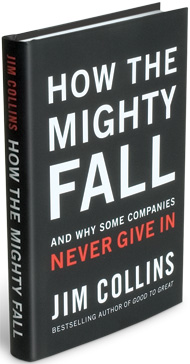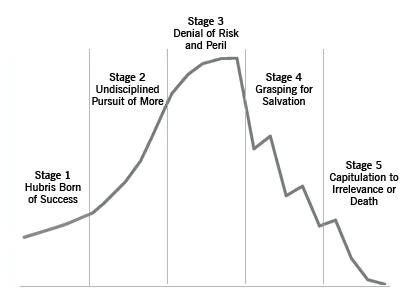We live in some of the craziest economic times recorded in modern history. Everyday you open the paper to see the latest big name corporation that has closed it’s doors. Any leader that desires to lead their organization with excellence would do themselves a favor to take some time to study how this happens. Jim Collins has done just that in How the Mighty Fall. Collins and his colleagues spent time researching the reasons that prominent companies that seem to have great leadership and a lot of success in the marketplace prior to filing Chapter 11 or being sold for pennies on the dollar. Just as important as it is to study successful companies to try and emulate their strategies, it is critical to understand the anatomy of a failure.
I highlighted several things while reading and have typed those notes below…
- Might it be possible to detect decline early and reverse course, or even better, might we be able to practice preventive medicine?
- I’ve come to see institutional decline like a staged disease: harder to detect but easier to cure in the early stages, easier to detect but harder to cure in the later stages. An institution can look strong on the outside but already be sick on the inside, dangerously on the cusp of a precipitous fall.
- Every institution is vulnerable, no matter how great. No matter how much you’ve achieved, no matter how far you’ve gone, no matter how much power you’ve garnered, you are vulnerable to decline. There is no law of nature that the most powerful will inevitably remain at the top. Anyone can fall and most eventually do.
- Stage 1: Hubris born of success
- Stage 2: Undisciplined pursuit of more
- Stage 3: Denial of risk and peril
- Stage 4: Grasping for salvation
- Stage 5: Capitulation to irrelevance or death
- We do ourselves a disservice by studying only success.
- Dating back to ancient Greece, the concept of hubris is defined as excessive pride that brings down a hero, or alternatively, outrageous arrogance that inflicts suffering upon the innocent.
- Does your primary flywheel face inevitable demise within the next five to ten years due to forces outside your control–will it become impossible for it to remain best in the world with a robust economic engine?
- Have you lost passion for your primary flywheel?
- Those who build great companies have drive and passion and intensity and an incurable itch for progress somewhere in their DNA to begin with.
- If I were to pick one marker above all others to use as a warning sign, it would be a declining proportion of key seats filled with the right people. Twenty-four hours a day, 365 days a year, you should be able to answer the following questions: What are the key seats in your organization? What percentage of those seats can you say with confidence are filled with the right people? What are your plans for increasing that percentage? What are your backup plans in the event that a right person leaves a key seat?
- The best leaders we’ve studied had a peculiar genius for seeing themselves as not all that important recognizing the need to build an executive team and to craft a culture based on core values that do not depend upon a single heroic leader.
- The greatest danger comes not in ignoring clear and unassailable facts, but in misinterpreting ambiguous data in situations when you face severe or catastrophic consequences if the ambiguity resolves itself in a way that’s not in your favor.
- When we find ourselves in trouble, when we find ourselves on the cusp of failing, our survival instinct–and our fear–can evoke lurching, reactive behavior absolutely contrary to survival. The very moment when we need to talk calm, deliberate action, we run the risk of doing the exact opposite and bringing about the very outcomes we most fear.
- Not all companies deserve to last. Perhaps society is better off getting rid of organizations that have fallen from great to terrible rather than continuing to let them inflict their massive inadequacies on their stakeholders. Institutional self-perpetuation holds no legitimate place in a world of scarce resources; institutional mediocrity should be terminated, or transformed into excellence.
- The signature of the truly great versus the merely successful is not the absence of difficulty, but the ability to come back from setbacks, even cataclysmic catastrophes, stronger than before.



